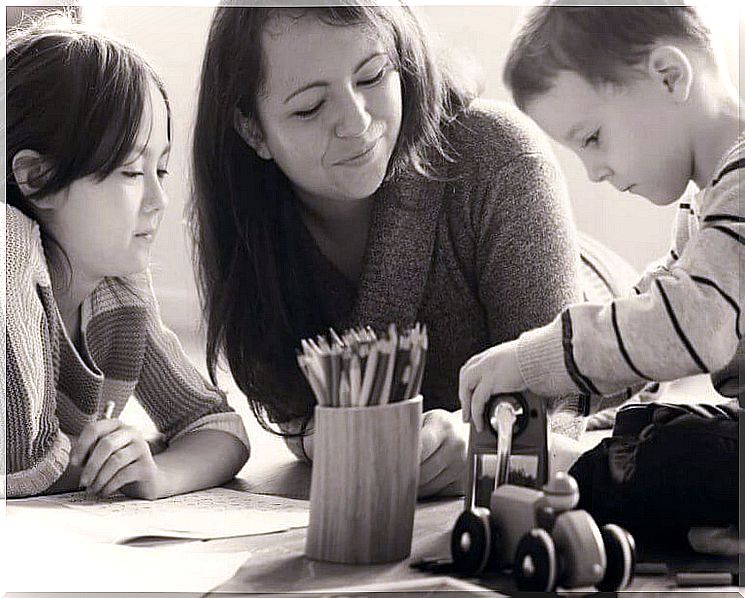3 Simple Tips To Make Kids Listen To You

During childhood, the pre-frontal cortex develops, and impulse control is therefore a complicated task for children. The control of the tension also, which is directed more by the external stimuli than by the conscience. Thus, it is normal that when spoken to, they have a great tendency to distraction and dispersion.
Because in the absence of a magic formula that would allow their pre-frontal cortex to develop before adolescence ends, we have at our disposal a few simple tips. Through them, you will be able to make them listen to you and understand you, and you will obtain commitments from them to practice what you ask of them.
Let’s go!
Asking for their attention and keeping it
The ease of distraction will be our worst enemy for the communication of the little ones. But how to overcome it? Well, first of all, you have to remove from their sensory field any stimuli that can distract them. Logically, it is difficult to remove them all: we are not going to remove all the drawings from the wall of their room, nor remove all the lint from the hallway or the coloring from the furniture when we want to talk to them. So what to do?
There is a possibility: it is important that in the house there is a space that does not contain this type of stimulation that is so attractive to them. So you force them to focus on yourself. This is useful when you want to correct them as well as when you want to congratulate them or give them an order. Either way, the goal is to get the message understood.
What not to do? Talk to them in front of the TV, when they play, draw or read. Not talking to them means avoiding sending them important messages while they are doing another activity, not not talking to them at all during games, for example.

In attention, the most important sense is sight and this is the one we need to make sure of. We need to make the child look at us: Children, like adults, normally listen to the place where they are looking. We can take their faces and solicit their gaze: “Please, Marie, look at me”.
Talking to them “short” helps children
If their attention is not fully developed, neither is their memory. When we give them an order, it is best to keep it as short and as precise as possible. You have to go in this order:
- What does he have to do ?
- How and where should he do it? Counsel, if this is the first time, that he is doing it or if you feel that he can do it in another way, otherwise the child may think that you do not trust him.
- When should he do it? When the child is young, it is recommended to give orders as immediate as possible. If you want him to do something when the movie is over, wait until it’s over and tell him. Do not do it before because otherwise it is likely that he forgets. Then you will not know if it is heedlessness or if he disobeyed for other reasons. In any case, you will have to repeat the order.
Something else related to time. If you’ve asked him something for when he’s finished the day, don’t repeat it every five minutes. Let play have its recreational function, and don’t encourage him to think of something different from what he is doing. If there’s anything great about children, it’s their ability to focus on the present. Let him enjoy it to the fullest!
Another trick is to give the orders one by one, correct aspect by aspect and congratulate as well. “I like that you do this because…” If he drew a drawing in which he did not cross out and chose the colors well, congratulate him on one of these aspects and wait until he does another to congratulate him again. Same thing to correct: children do a lot of things that have a lot of room for improvement, but this improvement must be slow and based on small goals.
A tip for children to pay more attention when we want to congratulate them for something they have done well, is to tell them that we are going to tell them a secret …

Choose the best time
If you correct or punish a child, it is best to do it as soon as possible, so that between what he did wrong and the consequences there is as little space and time as possible. . Think that for children the day is very long: for them, when they wake up in the morning, what happened the night before is very distant.
We advise you that, when giving him important information, you first assess the condition of the little one. A calm child is not the same as an excited child because he knows it is time for something that enchants him, like going to the park. A child who has just woken up and full of energy is also not the same as a child who is tired at the end of the day.
A child who has his arms relaxed is totally different from a child who has his arms folded with a defensive attitude. Thus, before discussing with him, it is important to give him a few moments to relax and that he enters into the communicative situation.
Here’s a great tip for learning how to relax your kids: games!
Finally, to make sure they have understood correctly, it is important to ask them for confirmation and in some cases to listen to what they think of what we have told them.
The child is small, and let’s not forget that he acts like he acts for a good reason. And if you did not know, take the seed to make your interventions even better. Remember that if you keep the line of communication open and ask him questions, he will confide in you more easily and the actions you take will be more suited to his needs.
Somehow motivate yourself to communicate with your children. They are smart and it can be complicated for them at times, but remember that educating is a wonderful responsibility and worth it!
Also read:








